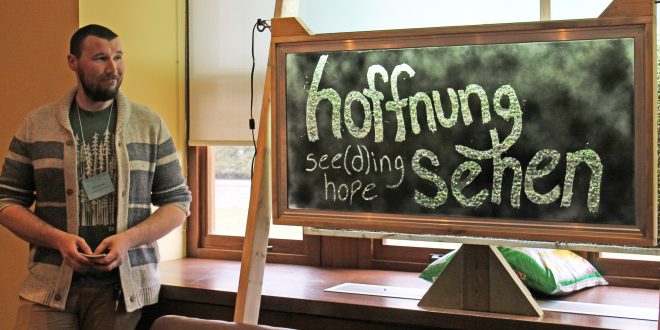The 11th Annual Toronto German Studies Symposium (April 12-13, 2018) brought together over 25 emerging and established scholars working in the area of environmental humanities. The speakers from Canada and abroad hailed from a breathtaking array of disciplines, from anthropology, architecture, and arctic studies, to literary and cultural studies, environmental studies, education, public and indigenous health, and religion. Prof. Sabine Wilke (Washington University), one of the pioneers of ecocritical work in the field of German studies, delivered the keynote on human-nonhuman interactions and performance.
The Symposium engaged many of the key issues in current environmental humanities work. Panels explored sustainability and world-making, human interrelations with plants and animals, water ethics, cultures, and politics, memories of petrocultures and industrialization, and littoral spaces in built, natural, and literary environments. Two energizing roundtables provided an opportunity to consider pedagogical approaches to environmental humanities as well as institutional and conceptual contexts of environmental humanities work – both at the U of T and elsewhere.
A highlight of the event was the presentation of an installation – commissioned especially for the Symposium – by environmental artist Paul Chartrand. Playing on the German homophones säen (to sow) and sehen (to see), ‘hoffnung sehen / see(d)ing hope’ takes up a number of the artist’s central concerns: the idea of plants as living collaborators, the relationship between nature, culture, and perception, and the effort to create scenarios in which humans engage in a productive exchange with the vegetative. In this work, viewers see the text in the form of living, speckled pea shoots visible through etched glass.
In his contribution to the kick-off panel, ‘Sustainability in an Imaginary World’, Prof. John Robinson, U of T Presidential Adviser on the Environment, Climate Change, and Sustainability, offered hope of a positive way forward in a notion of ‘regenerative sustainability’. Prof. Robinson urged us to shift our focus from doing less bad to doing more good, from damage control to creating benefits, from making sacrifices to making contributions. If there was a single theme that emerged from the symposium, it was that the humanities have a crucial role to play in helping to imagine this path to a livable future.
 Department of Germanic Languages & Literatures University of Toronto
Department of Germanic Languages & Literatures University of Toronto
